Now available: Verde River Watershed Report Card Newsletter

Andrew Elmore, Alex Fries, and Emily Nastase kicked-off the Verde River Watershed Report Card at the stakeholder workshop in Cottonwood, Arizona, November, 2018. Participants of the workshop worked together to conceptualize the watershed, create a shared vision, and determine potential indicators for the report card. The outcomes of the workshop are summarized in this newsletter.
Welcome, Annie!

Annie Carew is the new Science Communication intern at the Annapolis office, where she assists in the creation of various science communication products. Annie recently graduated from UMCES with a Master’s degree; her thesis focused on genetic identity in SAV restoration. In her spare time, Annie enjoys reading, board games, and exploring.
Louisville, KY
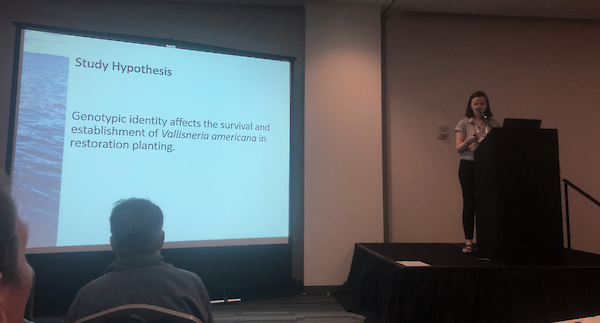
Annie Carew attended the annual Ecological Society of America conference. The conference theme was "Bridging Communities and Ecosystems: Inclusion as an Ecological Imperative." Annie presented on her thesis research, participated in a session on National Parks history, and met colleagues from across the country.
Society of Women in Marine Science
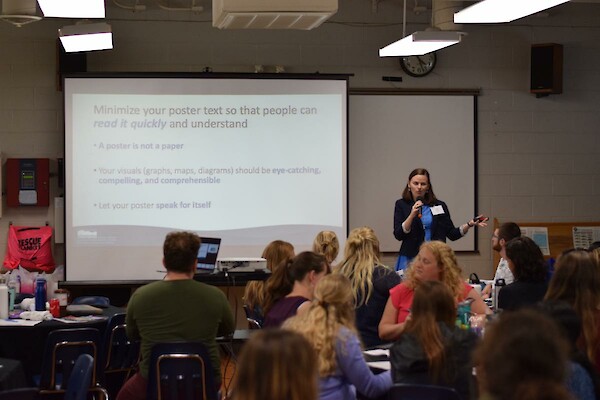
IAN staff members Bill Dennison, Katie May Laumann, Annie Carew, Nathan Miller, and Max Hermanson facilitated a science communication workshop at the first annual Delmarva Symposium of the Society of Women in Marine Science (SWMS), which was held at Horn Point Laboratory in Cambridge, MD. IAN staff gave presentations on storytelling, science visualization, and scientific poster design. Participants were encouraged to think about storytelling as a tool for science communication, and a poster design activity highlighted the importance of compelling visual elements.
IAN releases its self-appraising report card
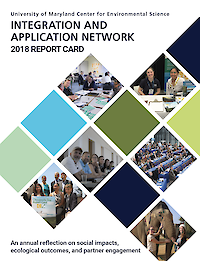
IAN released its 2018 report card. In the annual IAN Report Card, IAN staff reflect back on accomplishments from 2018. The self-assessment is based on indicators in three categories: social impacts, ecological outcomes, and partner engagement. Overall, IAN received an overall grade of B (86%) which is an improvement from the 2017 score of B- (81%). Click here to read the full report card and learn more about the projects IAN Staff worked on in 2018!
Western Lake Erie Report Card
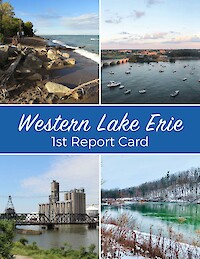
This year, we launched the first-ever report card for the western basin of Lake Erie and its associated watershed. The report is the culmination of nearly two years of work among partners and contributors from Michigan, Ohio, Indiana, and Ontario. Based on 2018 data, the lake received a C and the watershed received a C+.
International Seagrass Biology Workshop 2020
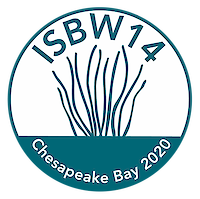
In August 2020, IAN will be hosting the fourteenth biennial International Seagrass Biology Workshop (ISBW14) in Annapolis, Maryland. The theme of the conference is "Signs of Success: Reversing the Course of Seagrass Degradation." Visit the ISBW14 website for more information.
Happy Holidays!
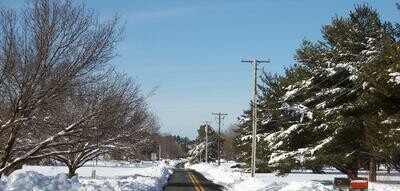
Our offices will be closed from December 25, 2019 to January 1, 2020. See you next year!
International Seagrass Biology Workshop 2020

In August 2020, IAN will be hosting the fourteenth biennial International Seagrass Biology Workshop (ISBW14) in Annapolis, Maryland. The theme of the conference is "Signs of Success: Reversing the Course of Seagrass Degradation." Visit the ISBW14 website for more information.
Welcome, Tom!
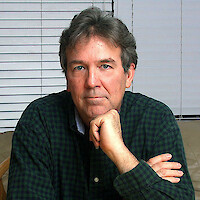
This month, we welcome Tom Holloway to our Chesapeake Bay Program (CBP) team. For the last nine years, Tom has been an application engineer and developer at Royal Caribbean Cruise Line, looking after an application that supports the deck, engines, and other onboard mechanical systems. Tom's earlier career was in the music industry. An interest in digital electronics led to an electrical engineering degree with an emphasis in digital design and microprocessors.
Due to the global coronavirus pandemic, ISBW14 and WSC2020 are postponed until summer 2022
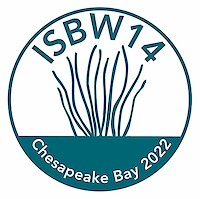
We will update everyone as we have more information. Please discontinue abstract submission at this time, and stay safe and healthy. Visit the ISBW14 website for more details.
Congratulations, Dylan!
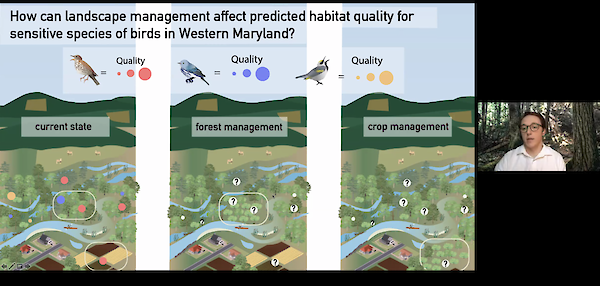
IAN science communicator Dylan Taillie is finishing his Master's degree at UMCES this year. On November 30, Dylan defended his thesis, which examined the effects of landscape management strategies on songbird habitat quality in western Maryland. Dylan has been with IAN and UMCES in various capacities since 2015. Unsurprisingly, his thesis presentation was filled with killer graphics. Great work, Dylan!
Join us for virtual workshops on coastal adaptation and disaster preparedness
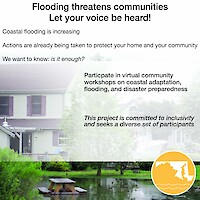
Much of Maryland's population lives and works along the coast. Coastal communities are vulnerable to extreme weather events and sea level rise, which cause flooding. As climate change continues, flooding will become more frequent and severe, so it is vital that coastal communities adapt. Many communities have already undertaken action. But are these actions effective? And how can we measure adaptation progress in the face of ongoing change? The Maryland Coastal Adaptation Report Card seeks answers to these questions, and we are asking for community participation in workshops to develop the report card. Visit the project website for more information, or contact the project directly MDcoastaladapt@gmail.com
Due to the global coronavirus pandemic, ISBW14 and WSC2020 are postponed until summer 2022

We will update everyone as we have more information. Please discontinue abstract submission at this time, and stay safe and healthy. Visit the ISBW14 website for more details.
Welcome, Crystal!
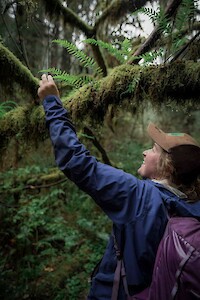
The newest addition to our team is Crystal Nichols, who joins us as an intern working remotely from southern Oregon. Crystal attended Ball State University for her bachelor's degree in aquatic biology and fisheries, and Southern Oregon University for her master's degree in environmental education. She will work with IAN video team members to create and edit video modules for various exciting projects. When Crystal is not working, she spends as much time as she can outside, trail running, kayaking, and snorkeling in beautiful Oregon rivers.
The Hack-the-Bay Hackathon was a success
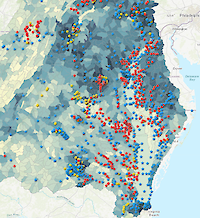
Hack the Bay, a hackathon led by Booz Allen Hamilton in partnership with the Chesapeake Monitoring Cooperative, was a rousing success! Participants represented skills, positions, and levels of expertise across data science, web development, and human-centered design. The hackathon helps the CMC reach its goals of analyzing and visualizing monitoring data. The incredible value of this previously unanalyzed, nontraditional water quality data was explored through four challenges. Four winning projects were selected as the top solutions in their categories and were showcased to a virtual audience. You can view all the hackathon entries and winners here.
Due to the global coronavirus pandemic, ISBW14 and WSC2020 are postponed until summer 2022

We will update everyone as we have more information. Please discontinue abstract submission at this time, and stay safe and healthy. Visit the ISBW14 website for more details.
Welcome, Kelly!
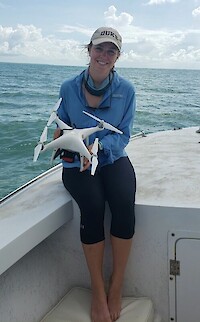
At the end of September, Kelly Dobroski joined the IAN team as a Science Communicator. Her background includes a Master of Environmental Management from Duke University, where she used drone technology to map coastal marshes and mangroves. During her masters, she studied environmental communications and geospatial analyses to convey technical information to broad audiences. Kelly worked with the North Carolina Coastal Federation to develop a state-wide action plan to implement nature-based stormwater strategies to reduce flooding and improve water quality. When she's not communicating science, you can find Kelly running, paddling, and baking.
First-ever Western Lake Erie Report Card now available
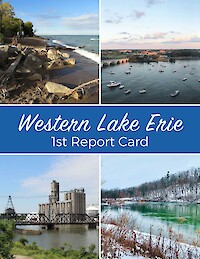
On August 14, IAN launched the first-ever report card for the western basin of Lake Erie and its associated watershed. The report is the culmination of nearly two years of work among partners and contributors from Michigan, Ohio, Indiana, and Ontario. The virtual release event was well-attended and features speeches from Toledo Mayor Wade Kapszukiewicz and U.S. Representative Debbie Dingell. You can view the full report card here.
Farewell, Brianne!
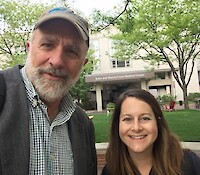
This month, IAN said a very fond farewell to science communicator Brianne Walsh, who worked for IAN for eight years after completing her Master's degree at UMCES. Brianne worked on an impressive array of projects, including the recently published Western Lake Erie Report Card and the national-scale effort synthesizing the impacts of ecological drought at each of the eight regional USGS/DOI Climate Adaptation Science Centers, which can be viewed here. Brianne's next job will take her closer to home in Rochester, New York. Thank you so much for all of your hard work, Brianne. You will be missed, and good luck!
Due to the global coronavirus pandemic, ISBW14 and WSC2020 are postponed until summer 2022

We will update everyone as we have more information. Please discontinue abstract submission at this time, and stay safe and healthy. Visit the ISBW14 website for more details.
Farewell, Emily!
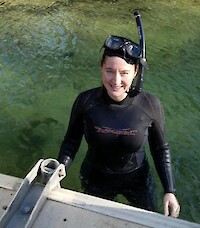
At the end of last month, IAN said a very fond farewell to science communicator Emily Nastase. Emily worked for IAN for almost three years on a broad range of projects and products. Whatever she was working on, Emily's artistic skills and work ethic were appreciated by all of us here at IAN. Emily is now starting her Master's degree at North Carolina State University, where she will study songbird ecology. Thanks for all you've done, Emily, and best of luck!
Congratulations, Suzi!
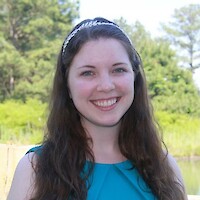
The National Sea Grant College administers one of the country's most prestigious marine policy fellowships, the Knauss Fellowship. Among 2021's fellowship class of accomplished graduate students is IAN's own Suzi Spitzer. As a Knauss Fellow, Suzi will spend a year working in the legislative or executive government on issues related to marine conservation and policy. Congratulations, Suzi, and best of luck!
Welcome, Joe!
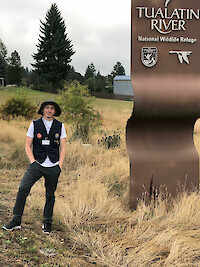
This month, IAN welcomes science communication intern Joseph Edgerton. Joe has a B.S. in Biology from Oregon State University, where he assisted in research on bacterial biocontrols. Joe became interested in data visualization and is excited to bring those skills to IAN. Currently living in Tigard, Oregon, Joe enjoys volunteering at the Tualatin River National Wildlife Refuge and having "decent" hacky sack skills (his words).
Due to the global coronavirus pandemic, ISBW14 and WSC2020 are postponed until summer 2022

We will update everyone as we have more information. Please discontinue abstract submission at this time, and stay safe and healthy. Visit the ISBW14 website for more details.
IAN provides remote science communication course to IMET summer interns
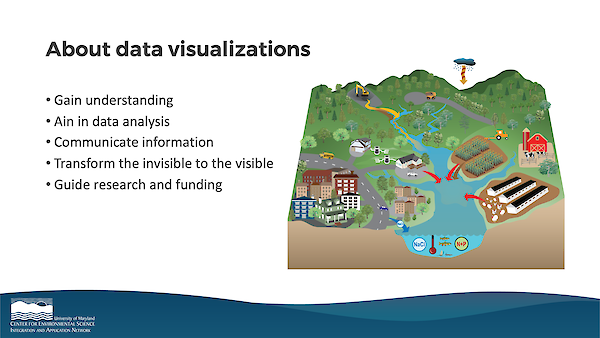
Annie Carew, Emily Nastase, and Nathan Miller taught an introductory science communication course for this year's IMET summer interns. While the ongoing COVID-19 pandemic has kept them from coming to IMET for the season, the interns will work together to analyze microbial data specific to Baltimore Harbor. The science communication course included storytelling strategies, designing theme statements, and a crash course in Adobe's Creative Cloud products, providing tools that the interns will use to promote their research this summer.
Due to the global coronavirus pandemic, ISBW14 and WSC2020 are postponed until summer 2022

We will update everyone as we have more information. Please discontinue abstract submission at this time, and stay safe and healthy. Visit the ISBW14 website for more details.
IAN's staff continues to grow and evolve

IAN graduate student Vanessa Vargas-Nguyen was conferred with the first Ph.D. under the Environment and Society foundation of MEES during the virtual UMCES commencement ceremony. She is now a science integrator at IAN and will spearhead the upcoming COAST Card project. Science communication intern Annie Carew is joining IAN staff as a science communicator. She graduated from UMCES last year. IAN's program manager Alexandra Fries was promoted to FRA3. She was also nominated as the FRA representative to the UMCES faculty senate.
International Seagrass Biology Workshop POSTPONED
Due to the global coronavirus pandemic, ISBW14 and WSC2020 are postponed until summer 2022. We will update everyone as we have more information. Please discontinue abstract submission at this time, and stay safe and healthy. Visit the ISBW14 website for more details.
Due to the global coronavirus pandemic, ISBW14 and WSC2020 are postponed until summer 2022

We will update everyone as we have more information. Please discontinue abstract submission at this time, and stay safe and healthy. Visit the ISBW14 website for more details.
IAN is working remotely during the COVID-19 crisis

Consistent with UMCES guidelines, IAN staff are doing their part to reduce the spread of COVID-19 by working remotely. IAN will conduct workshops and meetings virtually where possible for the duration of the crisis. IAN staff are equipped to work from their homes, and will continue to make progress on ongoing projects through the use of teleconference and video conference tools. We sincerely wish everyone safety and health as we all work to contain the spread of this disease.
Due to the global coronavirus pandemic, ISBW14 and WSC2020 are postponed until summer 2022

We will update everyone as we have more information. Please discontinue abstract submission at this time, and stay safe and healthy. Visit the ISBW14 website for more details.
International Seagrass Biology Workshop 2020

In August 2020, IAN will be hosting the fourteenth biennial International Seagrass Biology Workshop (ISBW14) in Annapolis, Maryland. The theme of the conference is "Signs of Success: Reversing the Course of Seagrass Degradation." Visit the ISBW14 website for more information.
International Seagrass Biology Workshop 2020

In August 2020, IAN will be hosting the fourteenth biennial International Seagrass Biology Workshop (ISBW14) in Annapolis, Maryland. The theme of the conference is "Signs of Success: Reversing the Course of Seagrass Degradation." Visit the ISBW14 website for more information.
2018 Maryland Coastal Bays Report Card
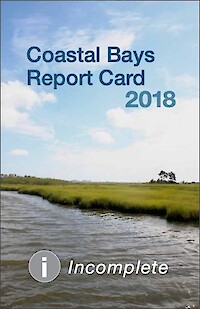
We produced the annual Maryland Coastal Bays Report Card with our partners at the Maryland Coastal Bays Program. The Bays received an Incomplete score for 2018 due to a lack of data.
Chesapeake Bay Water Quality Standards Attainment Indicator
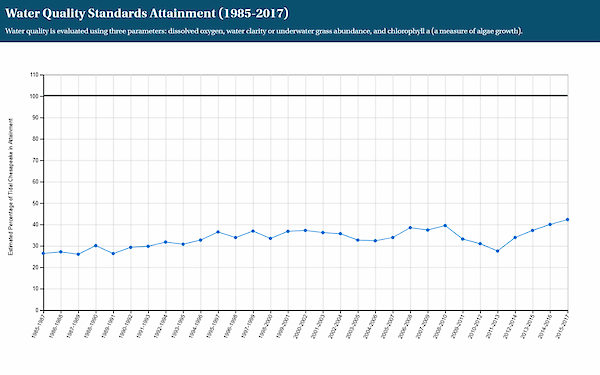
We produced the latest Chesapeake Bay Water Quality Standards Attainment Indicator, which scored a record high (42.3%). Related research reported a positive trend in the indicator, which is statistically linked to nitrogen load reduction in the watershed.
Bay Barometer: Health and Restoration in the Chesapeake Bay Watershed
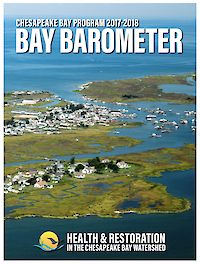
The Chesapeake Bay Program's annual science-based snapshot reported encouraging signs of resilience throughout the ecosystem, but reminds us that we still have a long way to go in meeting our restoration goals.
ChesapeakeDecision
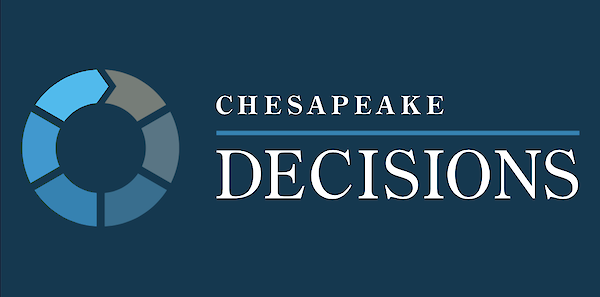
This tool promotes transparency and guides the Chesapeake Bay Program's Goal Implementation Teams and Management Board through the Strategy Review System, a structured process that applies adaptive management toward the Chesapeake Bay Watershed Agreement.
Upcoming meetings and conferences
IAN projects and employees will be attending and presenting at a variety of virtual conferences this spring and summer, including:
- At the upcoming National Monitoring Conference this month, Caroline Donovan will present on behalf of the Cheseapeake Monitoring Cooperative.
- At the Citizen Science conference CitiSciVirtual: Local, Global, Connected in May, Caroline Donovan will attend on behalf of the Chesapeake Monitoring Cooperative. Look for the CMC's viritual poster!
- At the International Coral Reef Symposium in July, we will present the Coral Reef Ecosystem Status and Trends Report Cards
Check out our new website!
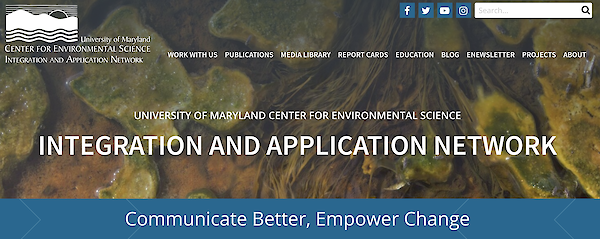
We are happy to announce the launch of our brand-new website at ian.umces.edu
The new website has functions to search our symbol and image libraries and peruse all of our publications, projects, and staff profiles. Check it out!
Teaching summer scicomm courses
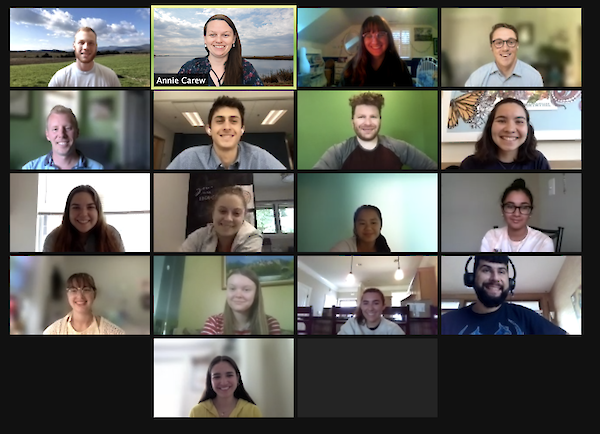
This month, some of our science communicators (aka scicommers) taught multiple virtual classes to summer interns at IMET and Maryland Sea Grant. Each course consisted of two sessions focused on the basics of scicomm, principles of design, and an introduction to Adobe Creative software.
We like to emphasize the importance of science as storytelling. No matter your system, experiment, or situation, there is an intrinsic narrative that you can use to make your science engaging to any audience. Finding the narrative, and tailoring it to your audience, is the basis of good science communication. We use tools like ABT statements (And, But, Therefore) and conceptual diagrams to communicate science to a variety of audiences, and it is always enjoyable for us to pass on those skills to younger scientists.
We thoroughly enjoyed our students this summer, and we wish them luck in the rest of their internships!
Three IAN report cards received Hermes Creative Award
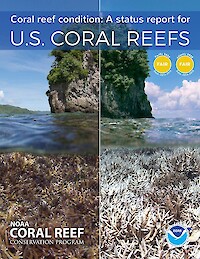
"The Hermes award is an international awards competition of approximately 6,000 entries for creative professionals involved in the concept, writing, and design of traditional and emerging media. Hermes Creative Awards recognizes outstanding work in the industry while promoting the philanthropic nature of marketing and communication professionals. The Platinum award is the highest-level designation, and the three UMCES campaigns reached over 700 million people in watershed communities." (Associated Press)
The three projects highlighted by this award are the Coral Reef Condition Status Reports, the 2019 Chesapeake Bay Watershed Report Card, and the Western Lake Erie 1st Report Card. We are proud to share this award with our partners at Yes& Agency, and are deeply grateful to all of our staff who made these projects possible.
We're hiring!
Come work with us! We're hiring for two positions.
- The Science Communicator will use a variety of software (Adobe Creative Suite, ArcGIS, R Studio, etc.) to develop print and digital media as well as analyze large and complex datasets. Excellent communication and organizational skills are necessary. Ability to work in a fast-paced environment with little supervision is a must. Self-directed work is a large portion of the work time. Ability to work both in-person and virtual or a hybrid is required. Bachelor's degree required, advanced degreee preferred.
- The Science Communication Instructional Designer will support instructional design projects from start to finish under the guidance of the Project Manager in the socio-environmental science field. This includes managing the workflow of the development process by coordinating the input from subject matter experts and other team members. Six-month contractual, advanced undergraduate or recent graduates preferred. Experience creating and editing videos necessary.
Welcome, Logan!
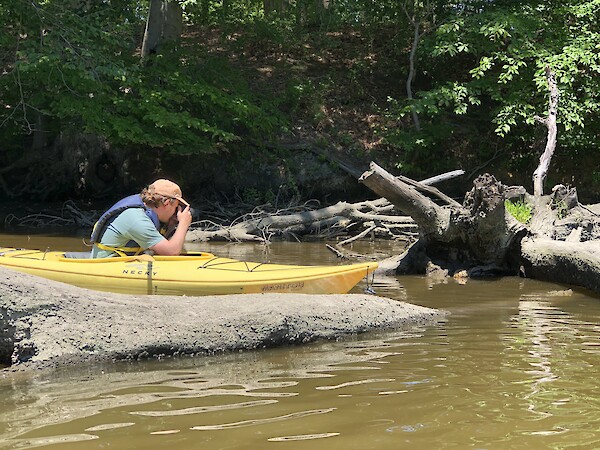
This month, IAN welcomes science communication intern Logan Bilbrough. Logan has a B.A. in communication from Salisbury University, where he had concentrations in media studies and environmental studies. Logan is interested in communicating science through media and has experience in videography, photography, and social media content creation. Currently living in Centreville, Maryland, Logan enjoys filmmaking, wildlife photography, and fishing.
Updating the Texas Coast Report Card in workshops
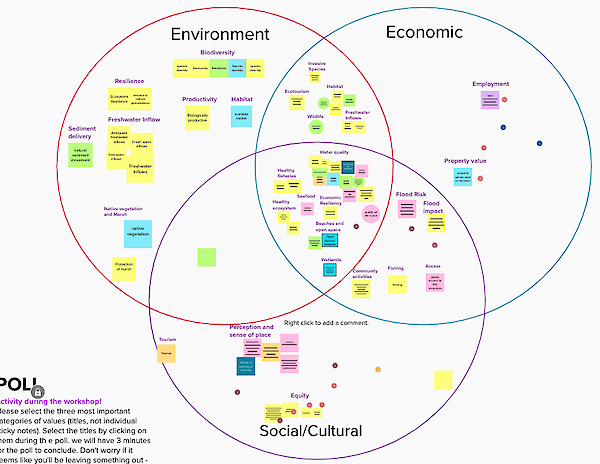
The first round of stakeholder workshops for the updated Texas Coast Report Card are under way. Through the month of October, IAN staffers Heath Kelsey, Vanessa Vargas-Nguyen, and Annie Carew are attending virtual workshops hosted by the Harte Research Institute. The updated report card, which will include economic and social as well as environmental indicators, is divided into several smaller, regional report cards. Each region represents one or several of the small coastal bays along the southern Texas Coast.
Stakeholders from each region are gathering virtually to discuss what's important to their ecosystems, from bird populations to hotel revenue, and what threatens ecosystem health, including the various threats associated with climate change. Future meetings and workshops will define indicators, thresholds, and potential data sources for the report cards.
Farewell, Simon!
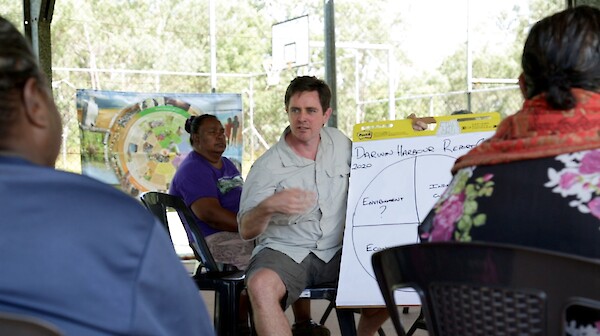
This month, we say a fond farewell to Simon Costanzo, who has been with IAN for ten years as a science integrator. Simon has worked a wide variety of projects, including the Kwando and Kafue River Report Cards, and the Darwin Harbour Report Card. One of Simon's future endeavors is continuing to work with IAN at DarwinIAN, an IAN-esque organization based in Brisbane, Australia. Thanks for all you've done, Simon, and good luck!
We were at the Inclusive Scicomm Symposium
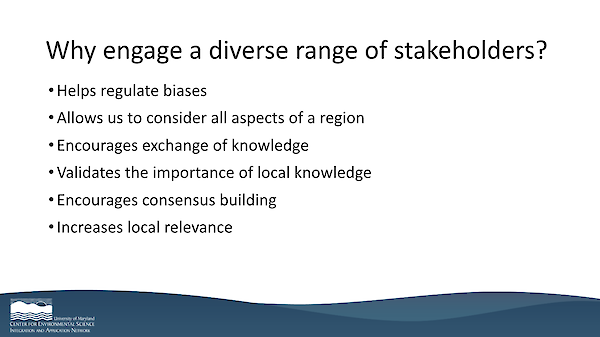
IAN science communicators Nathan Miller and Annie Carew presented at the Inclusive SciComm Symposium, hosted by the University of Rhode Island's Metcalf Institute. "Inclusive science communication, or inclusive scicomm, is a global movement to shift the traditional paradigm of science communication toward an approach that centers inclusion, equity, and intersectionality. Although a growing number of people are committing themselves to inclusive scicomm, this movement is in its early stages, and is evolving rapidly." (The Metcalf Institute)
Nathan and Annie gave a presentation focused on the importance of equity in stakeholder engagement, and showed participants how to use stakeholder mapping to ensure inclusive engagement. We at IAN believe strongly that every voice deserves to be heard, and effective environmental decisions cannot be made without representation from all members of a community.
Happy Holidays from all of us at IAN!
Our offices will be closed from Friday, December 24 to Monday, January 3, 2022. Thanks to all our partners, collaborators, and staff for a great year!
Farewell, Caroline!

This month, IAN says a very fond farewell to program manager extraordinaire Caroline Donovan. Caroline has been with IAN since 2006 and has worked on a plethora of projects. Her experience with report cards, science communication, stakeholder engagement, and citizen science is invaluable. Caroline will be joining NOAA's Coral Reef Conservation Program as their Communications Director. Best of luck, Caroline, and thanks for all you've done!
Stakeholder engagement at CERF 2021
IAN was well-represented at CERF 2021, which was a fully virtual conference. Dr. Heath Kelsey and Dr. Bill Dennsion facilitated a workshop entitled "Engaging Stakeholders to Co-Design Waterway Health Report Cards." Identifying waterway restoration and conservation goals that are acceptable to all sectors requires meaningful engagement from all relevant stakeholders, but incorporating knowledge streams from these varied perspectives is challenging. The session introduced participants to the benefits of waterway health report cards and how they can be used to incorporate different values and knowledge of stakeholders, empowering all to better manage their local environment. Meanwhile, Dr. Katie May Laumann presented "Measuring Coastal Adaptation: Using where we are to inform where we're going" in a session entitled "Climate Change Resilience: the intersection of ecological shifts and societal impacts" alongside presenters from across the country. Both the workshop and presentation highlight IAN's strategies and leadership in stakeholder engagement for environmental decision-making.
Notable publications and projects from 2021
- Bhitarkanika Conservation Area Report Card: This region in northeastern India includes several protected areas, including a national park and wildlife sanctuaries. Overall, Bhitarkanika is in "good" condition (88%).
- Coastal Georgia Report Card: The seventh Coastal Georgia Report Card updates indicators and methods. Overall, Coastal Georgia received a "good" score (77%).
- Chesapeake Monitoring Cooperative Achievement Report: A summary report highlights the amazing partnerships, collaborations, and accomplishments of the Chesapeake Monitoring Cooperative over the last six years.
- USGS Chesapeake Science Strategy: This document summarizes goals and accomplishments towards implementing USGS's four integrated science themes for the Chesapeake Bay region.
- Darwin Harbour 2021 Integrated Report Card: The Harbour and its catchment received an overall score of B- (good), indicating that more can be done to better understand and improve the region.
- BlueTech Maryland Consortium: The consortium will collaborate on technological innovations in aquaculture, offshore wind, flood management, sustainable ports, urban waterfronts, and climate change.
- Chesapeake Behavior Change: Explore the site to learn about the Stewardship Index Survey, its finding, and how to use them to create an effective behavior change campaign.
- COAST Card partnership: The Coastal Ocean Assessment for Sustainability and Transformation (COAST) Card is an international, transdisciplinary research program seeking to foster solutions to global sustainability challenges. This project brings together researchers from the USA, Japan, Philippines, Norway, and India. COAST Card merges three tools: socio-ecological network analyses; socio-environmental report cards; and system dynamics models. This ongoing partnership made progress in 2021 with newsletters and meetings.
Farewell, Dylan!
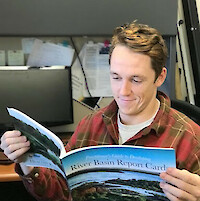
This month, IAN says a very fond farewell to science communicator extraordinaire Dylan Taillie. In his almost seven years at IAN, Dylan worked on a variety of projects, from the Tennessee River Basin Report Card to our ongoing USGS partnership. Dylan's hard work and friendly attitude were widely appreciated. Dylan is joining the Department of Natural Resources to continue valuable work on conserving Maryland's habitat. Best of luck, Dylan! You will be missed.
First-ever Coastal Adaptation Report Card published

The first-ever Maryland Coastal Adaptation Report Card was released on January 21, 2022. The online webinar was attended by nearly 200 people from across the state of Maryland, including Senator Ben Cardin. Maryland received an overall score of B- in coastal adaptation, indicating that we are well-prepared for ongoing and oncoming climate-related coastal changes, but that more work is needed. The report card features 15 indicators sorted into four categories. Some indicators measured already meet, or are close to meeting, current adaptation goals, while others require significant investment to achieve adaptation goals.
Paper publication: NOAA Coral Reef Assessment
Several IAN staff participated in writing a paper on the methods and results of our far-reaching coral reef ecosystem status reports. This project lasted for six years and generated ten separate reports on the status of the coral reefs under U.S. jurisdiction. The national report in 2020 summarized jurisdiction reports. U.S. Atlantic and Pacific coral reefs were scored separately; each region of coral reefs is in fair condition overall. The reefs range from moderately impacted to very impacted by changing conditions such as disease and habitat degradation.
Virtual scicomm course
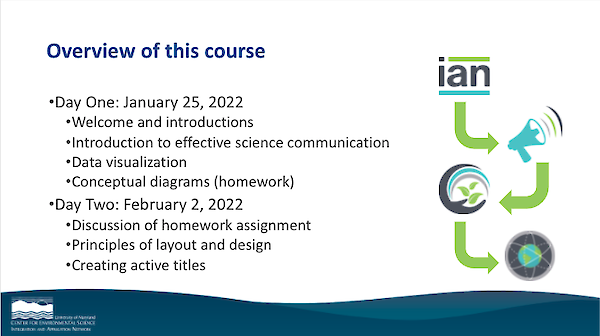
Several IAN science communicators taught a two-day science communication course to the 4-D Reef Early Stage Researchers through the Naturalis Biodiversity Center. Nearly 20 students joined us for discussions of data visualization and group activities like conceptionary.
Farewell, Logan!
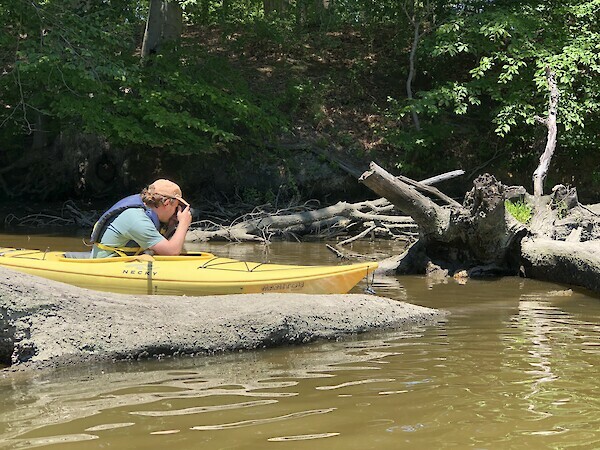
Last month, IAN said a fond farewell to science communication intern Logan Bilbrough. Logan's help with videography and photoraphy has been invaluable, and we are sure he will continue to thrive in his new role at Maryland Sea Grant. Thanks for all your hard work, Logan, and best of luck!
Goodbye, Steven!
This month, IAN says goodbye to data science extraordinaire Steven Guinn. Steven's help with databases, large datasets, and map were indispensible on many projects. Good luck, Steven!
Farewell, Kelly!

This month, IAN says a fond farewell to science communicator Kelly Dobroski. In her tenure at IAN, Kelly worked on a variety of global projects including the ongoing COAST card partnership. Thanks for all you've done, Kelly, and good luck!
Coming soon: the International Seagrass Biology Workshop
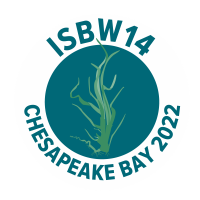
The 14th International Seagrass Biology Workshop and 2022 World Seagrass Conference will be held at The Graduate Annapolis Hotel in Annapolis, MD, USA from 7–12 August 2022.
This biennial event is the only international meeting tailored specifically to seagrass scientists, professionals, and students. A total of 39 countries were represented at the last two meetings; your sponsorship would allow you to reach professionals and students from all over the world with a wide range of experience and expertise.
Please take a moment to consider sponsoring this exciting event that’s taking place in the U.S. for the very first time. You can opt to simply sponsor the event or attend as an exhibitor. Visit the ISBW14 website for more information on how to become a sponsor.
Welcome, Lili!
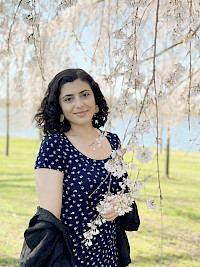
Hi, my name is Lili Badri. I'm originally from Alabama, where I graduated from the University of South Alabama with a B.S. in Chemistry. Afterwards, I attended SUNY-ESF in Syracuse, NY where I earned my M.S. in Environmental Science this past December. My previous research experiences mostly focused on dissolved organic matter (DOM) characterization and dynamics. My science background has given me a greater understanding of the importance of scientific communication, and I'm looking forward to strengthening my communication knowledge and skills during my time at UMCES IAN.
The Chesapeake Bay & Watershed were in moderate condition in 2021
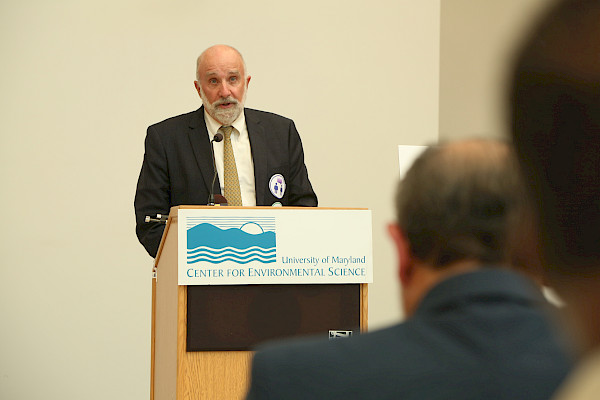
On June 6, we released the 2021 Chesapeake Bay & Watershed Report Card. The event was held in-person at the Institute of Marine and Environmental Technology in downtown Baltimore, MD. A small crowd of Maryland government officials, local sustainability leaders, Congress members, and interested scientists gathered to hear the results of this year's report card. The 2021 Chesapeake Bay & Watershed Report Card is unique because it includes, for the first time, economic data in its suite of indicators. Economic information is vital to understanding the relationship between humanity and the environment in the Chesapeake Bay region.
Similarly, we are committed to better representing environmental justice in our annual Chesapeake Bay and Watershed Report Cards. In addition to the social vulnerability index, heat vulnerability index, and walkability indicators, this year’s report card also includes two new economic indicators with environmental justice implications: income inequality and housing affordability.
The full report card can be viewed here.
The Cuando River Basin Report Card is in moderate conditioin
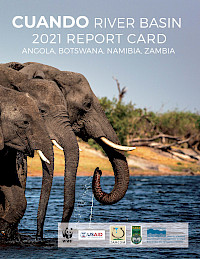
The first-ever Cuando River Basin Report Card is now available! There is also a short video summarizing the project and its importance. Overall, the basin is in moderate health. More information and work is needed to improve understanding of the basin and improve the score.
The Cuando (or Kwando) River Basin spans parts of four countries--Angola, Botswana, Namibia, and Zambia--in south-central Africa. The basin is home to fewer than 200,000 people but shelters half of Africa's remaining savnnah elephant population and is critical habitat for many other wildlife species.
This report card is part of a larger project entitled “Water Partnerships for a Resilient Cuando Basin,” funded by the United States Agency for International Development (USAID) and supported by the World Wildlife Fund for Nature (WWF) Zambia, the Zambezi Watercourse Commission (ZAMCOM), and the Kavango-Zambezi Transfrontier Conservation Area (KAZA TFCA).
Seagrass biology workshop next month in Annapolis
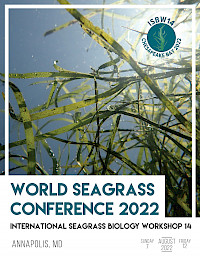
Next month, IAN is hosting the 14th biennial International Seagrass Biology Workshop (ISBW14) and World Seagrass Conference. The theme of the conference is "Signs of Success: Reversing the Course of Seagrass Degradation." Visit the ISBW14 website for more information. We are still looking for conference sponsors; you can view our sponsorship prospectus here.
World Seagrass Conference and International Seagrass Biology Workshop
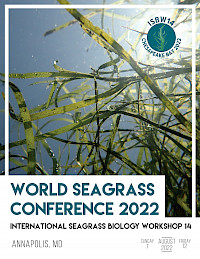
Starting on August 7, we will be hosting the World Seagrass Conference and International Seagrass Biology Workshop in downtown Annapolis, MD. This biennial conference brings together seagrass scientists, students, and enthusiasts from around the world. The Chesapeake Bay is uniquely suited to such a conference because of its long history of seagrass growth and conservation, especially in light of this year's theme, "Signs of Success."
The conference will last until Friday, 12 August, and features a half-dozen field trips. Participants will visit iconic Chesapeake Bay locations such as:
- Susquehanna Flats: the largest and most iconic seagrass meadow in the Chesapeake region, featuring a high diversity of seagrasses but dominated by wild celery (Vallisneria americana).
- Jug Bay National Estuarine Research Reserve: one piece of the Chesapeake Bay National Estuarine Research Reserve, featuring tidal freshwater marshes and forested wetlands.
- Assateague Island and National Seashore: a barrier island home to iconic wild horses and nesting seabirds as well as the seagrass beds of Sinepuxent Bay.
In addition, attendees will participate in a suite of workshops covering a variety of topics, including:
- Promoting underrepresente voices in seagrass science
- Seagrass nurseries
- Science communication
- Stakeholder engagement
Welcome, João!
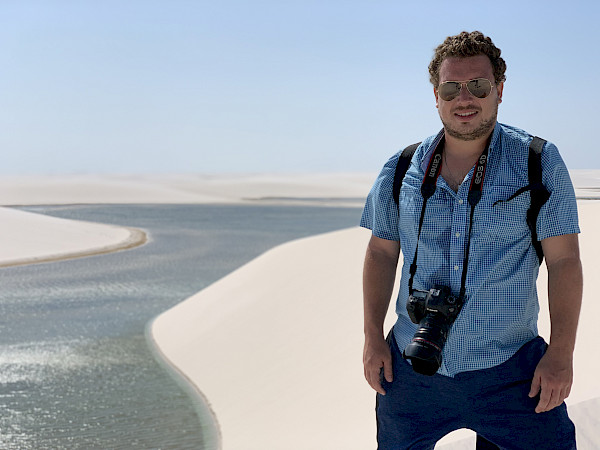
João Coimbra is a new Science Communicator at IAN. He is originally from Brazil where he graduated from Federal University of São João del-Rei with a B.S in Chemical Engineer. He has a Master’s degree in Environmental Analysis and Decision Making from Rice University. João previously worked in an initiative to facilitate the partnership between Chesapeake Bay and Guanabara Bay to enhance management and accelerate restoration, which included the development of an Environmental Health Report Card. Over the last two years he was working with the Guanabara Bay Watershed Committee. He enjoys photographing, cooking, visiting restaurants, and being outdoors.
Sustainability in the South Pacific



In mid-October, Heath Kelsey and Annie Carew traveled halfway across the globe to facilitate workshops in Nouméa, New Caledonia. This workshop brought together scientists and local managers from across New Caledonia and Fiji to discuss regional priorities. There was a focus on potential management actions in the face of climate change; marine temperature changes impact fisheries and food security, while intensifying storms and sea level rise contribute to coastal erosion that threatens communities. We look forward to continuing these discussions as part of our ongoing PACPATH project through the Belmont Forum.
National Adaptation Forum in Baltimore
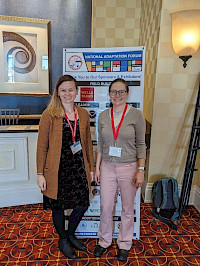
The National Adaptation Forum was in Baltimore this year, so it was an ideal opportunity for Katie May Laumann and Annie Carew to present on the Maryland Coastal Adaptation Report Card. There were many excellent presentations and stimulating discussions on the future of coastal adaptaion and management in the face of climate change. Many attendees and speakers recognize the importance of equity in climate adaptation: those communities that are first and worst affected are predominantly those that are least prepared to handle the oncoming changes because of historic and systemic inequities.
Farewell, Lorena!
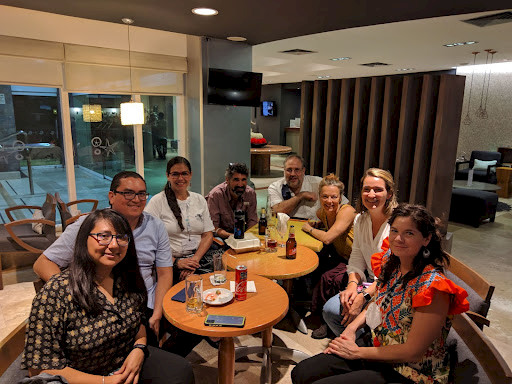
Last month, IAN said a very fond farewell to project manager Lorena Villanueva-Almanza. She worked with us on the 2021 Chesapeake Bay Report Card as well as the upcoming Michigan report cards and the ongoing LENS project. Lorena's positive attitude and task-oriented organization will be much-missed in our offices. Best of luck, Lorena!
Planning resilience on public lands

Last week, the RAMS team traveled to West Virginia to attend a National Park Service workshop on resilient forest planning. Katie May Laumann presented on the potential management applications of RAMS: assessing natural resources in parks focuses management actions on those areas that are most vulnerable to change. There were also talks on parks' efforts to manage invasive pests like emerald ash borer.
Welcome, Conor!

Conor is a new Project Manager with IAN in Annapolis, Maryland. He got his B.S. in Wildlife Ecology & Conservation from the University of Florida, his M.S. in Biology from Marshall University in WV, and his Ph.D. in Fisheries and Aquatic Sciences from Purdue University in IN. Since 2016, he has been an Associate Professor of Environmental Science at Tusculum University in TN. He was a postdoctoral fellow from 2013-2016 working as a lead data analyst of stream conservation in the Western Lake Erie watershed. Conor joins IAN’s team to help produce report cards for the Clinton, Detroit, Huron, River Raisin, and Rouge Rivers and will work with Dr. Katie May Laumann on the NPS Strategic Strategy Tool.
2022: a year in review
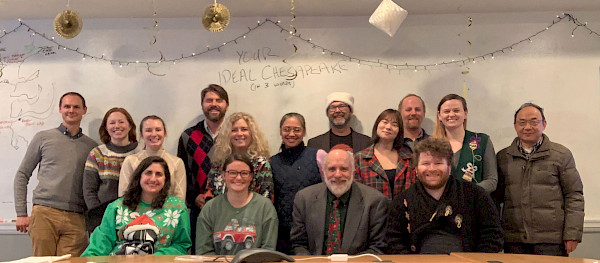
IAN is looking back on a great year in 2022. We continued to collaborate effectively with partners across the globe to assess and encourage responsible environmental stewardship. IAN's core principles of effective science communication and stakeholder engagement were evident in all of our work. Report cards, workshops, and scicomm courses forged ahead, many the result of long-standing productive partnerships. Thank you all of our collaborators, partners, colleagues, and staff for a great year, and here's to another great year in 2023!
Notable publications in 2022
- The first-ever Maryland Coastal Adaptation Report Card
- The annual Chesapeake Bay Report Card
- The first-ever Cuando River Basin Report Card
- The annual IAN Report Card
- The first-ever Upper Rio Grande Report Card
- The annual Maryland Coastal Bays Report Card and State of the Bays Report, published every five years
Teaching science communication in 2022
- January: the 4-D REEF Early State Researchers through the Naturalis Biodiversity Center
- June: IMET summer interns
- August: International Seagrass Biology Workshop course and University of South Carolina students
- October: Future Earth Coasts Monsoon School
- December: UMCES REEF Program Course
Online professional certificate in environmental management for sustainability

Our professional certificate program in Environmental Management for Sustainability is available on EdX, an online learning platform for open online courses. All four courses are self-paced. A professional certificate is available for verified learners, and all content is available for free. For more information, visit our certificate page on EdX.
COAST Card Stakeholder Listening Sessions
This year, the COAST Card project launched a series of stakeholder listening sessions in the D.C.-Maryland region to engage with local opinions on river condition and management. Listening sessions were held for three rivers:
- Patuxent River in Maryland
- Potomac River in Maryland/Virginia/D.C.
- Choptank River in Maryland
New partnership in the South Pacific
As part of the PACPATH project, IAN participated in a variety of seminars and workshops this year. These include:
- University of the South Pacific Seminar on SDG 14 Indicators for Pacific Island Countries
- Pacific Ocean Pathways Project Science-Society Council Meeting
- Initial PACPATH workshop in Nouméa, New Caledonia
Second PACPATH workshop in Suva, Fiji
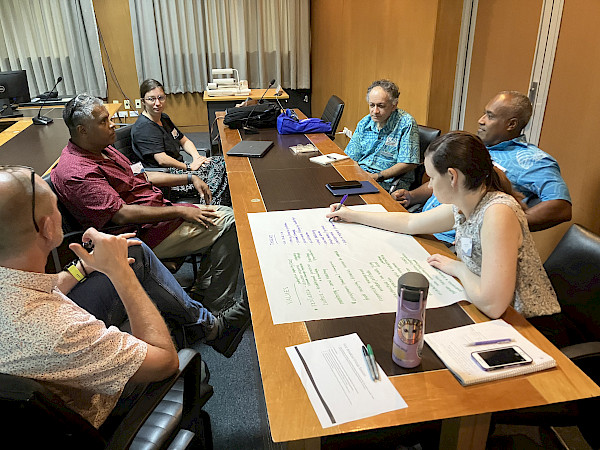
Last month, Annie Carew and Heath Kelsey traveled to Suva, the capital of Fiji, to facilitate the second workshop for the PACPATH project. This project brings together scientists and researchers from Europe, the U.S., and the South Pacific to define and examine the issues facing coastal communities in New Caledonia and Fiji. The first workshop in October focused on New Caledonia, while the second workshop focused on the issues facing Fiji. Workshop participants included government officials, researchers, traditional village leaders, and students. After three days of thorough discussion sessions in Suva, some workshop participants traveled up the coast to a writing retreat, where we had the unique opportunity to visit villages and a reef that is home to breeding dolphins. The PACPATH project is continuing work on New Caledonia and Fiji report cards, coming soon!
Admin Council DEI Retreat
The UMCES-wide Administrative Council had a retreat to discuss Diversity, Equity, Inclusion, and Justice (DEIJ) at UMCES. Annie Carew and Nathan Miller attended and participated. Last year, a survey was conducted to assess the cultural climate at UMCES, and most of the retreat was dedicated to discussing the results of that survey. UMCES as a whole is striving to improve its culture of collegiality and mutual respect across all campuses. A lot of progress has been made in the last several years, but there is still more work to be done. At IAN, we are furthering DEIJ in our work by incorporating environmental justice indicators into our report card projects and including diverse stakeholders in our projects.
Virtual workshops advance coastal adaptation efforts
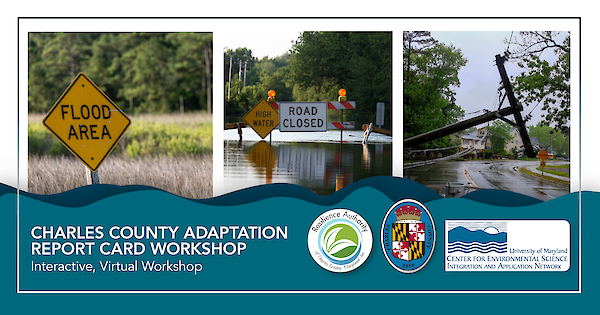
On February 22nd, IAN hosted two virtual stakeholder workshops for the Charles County Coastal Adaptation Report Card. The conversation at both sessions was engaging, with stakeholders providing valuable insights and passion for relevant environmental issues. We discussed flooding, erosion, sinkholes, fire management, and invasive species--all issues that impact Charles County as the climate changes. Next, we will search for datasets that enable us to assess these issues and develop a holistic view of how Charles County is preparing for environmental change.
Southeast Michigan Report Cards Released!
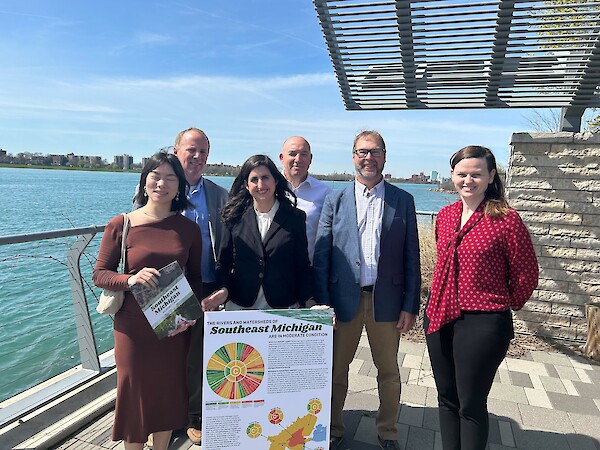
On April 16, IAN staff joined five watershed organizations in Detroit, Michigan for the release of the Southeast Michigan Report Cards. This project encompasses five watersheds in Southeast Michigan--the Clinton, Detroit, Huron, Raisin, and Rouge--and a summary document for the entire region. Over the last three years, IAN staff have worked closely with local Michigan scientists and managers to develop a suite of socioeconomic and ecological indicators. The relationship between people and the environment is strong; for example, human industry impacts water quality, and water quality impacts human health. By examining more than environmental factors, our socioenvironmental report cards capture a holistic view of the ecosystem and the people that rely on it. A huge thanks to our partners on this project!
19th Annual Chesapeake Watershed Forum
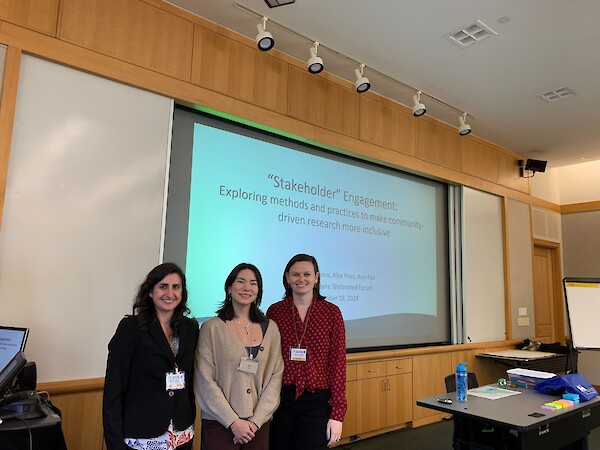
Every year, we attend the Chesapeake Watershed Forum in West Virginia. Our presence at this meeting solidifies our partnership with the Chesapeake Monitoring Cooperative and the Alliance for the Chesapeake Bay. This year, Annie Carew, Ann Foo, and Alex Fries presented two workshops: one on stakeholder engagement, and one on science communication. Both workshops were well-attended, and attendees were enthusiastic and engaged about the material. We enjoyed getting to speak to people from across the Chesapeake watershed about our work and theirs.
2023 Maryland Coastal Bays Report Card Release
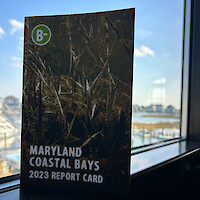
The 2023 Maryland Coastal Bays Report Card is now available! The release event was held in Ocean City, attended by scientists and managers as well as citizens and volunteers. Heath Kelsey and Annie Carew represented IAN at the event. The report card score is a B-, which is the highest score that the Coastal Bays have ever received. This increase was driven by improvements in the seagrass and hard clam scores, but there is still a lot of room for improvement. Congratulations to the Maryland Coastal Bays Program for another successful year!
Scientists Serving Communities
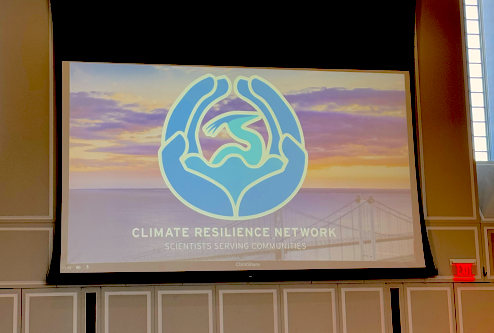
On January 8 and 9, Annie Carew and Lili Badri attended the second annual Scientists Serving Communities workshop in College Park. The workshop aimed to bring together UMD researchers with expertise in climate adaptation and resilience and connect them with regional stakeholders and community members who will use the information to strengthen their communities. The workshop’s partners included UMCES Integration and Application Network, Charles County Resilience Authority, and Southern Maryland Resource Conservation and Development. The structure of this workshop was entirely panel-based discussion, with active participation by all attendees. The conversations were stimulating and interesting, and apply to IAN's work to engage with communities to identify environmental priorities and solutions.
Meet the Scientist Series: Annie Carew
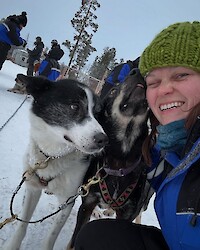
Hey all, my name is Annie Carew. I'm a science communicator at UMCES Integration and Application Network. Before I came to IAN, I was a graduate student at UMCES Appalachian Laboratory studying aquatic grass restoration and genetic diversity. I have loved the natural world my whole life; my journey into science began with observing the cardinals nesting off my parents' back porch and making notes in a field journal. I'm also a voracious reader, and my favorite books express a similar love and respect for nature. I've learned to merge those two passions into one with science communication. I wrote articles for my college newspaper that summarized current scientific research. As a graduate student, I received formal science communication training from IAN staff and felt that I'd found my calling. Our work is data-driven and solution-oriented, and I believe that this is the future of science. Developing creative solutions to social and environmental challenges will require creativity and collaboration. I am constantly bolstered by the passion and determination I encounter from my coworkers and project partners. Outside of work, I am a birder, traveler, and ecofiction writer.
If you value research like Annie's, consider donating to IAN here.
Charles County Climate Adaptation Report Card
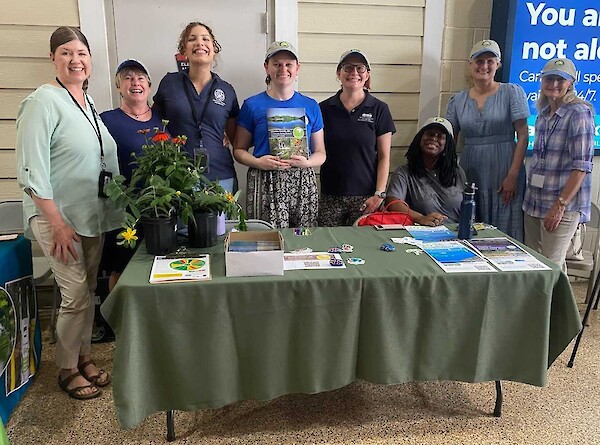
IAN and the Charles County Resilience Authority debuted the Charles County Climate Adaptation Report Card (RC) at the at the June Blue Crabs Environmental Resources event. The RC is the first to assess indicators of both resilience AND associated vulnerabilities to guide prioritization of adaptation actions. The County is already applying advice from the RC as they develop new parks! The RC is on the IAN ARC Program page here.
Antietam Creek Watershed Report Card
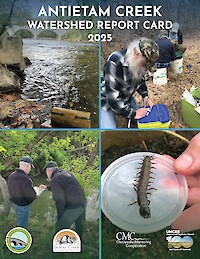
The Antietam-Conococheague Watershed Alliance (ACWA) released their first-ever Report Card in June. IAN worked with ACWA to develop this report card as part of our ongoing collaboration with the Chesapeake Monitoring Cooperative. Antietam Creek and its watershed received a moderate score of 48%, a C. This area faces challenges from land use changes, and the creek is still recovering from a large fish kill in 2023, the cause of which is still uncertain.
Celebrating Ten Years of Chesapeake Monitoring Cooperative
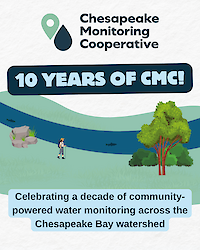
Over the past 10 years, the Chesapeake Monitoring Cooperative has grown into a network of volunteers, organizations, and partners working together to improve our understanding of the Chesapeake Bay. Together, we’ve collected over 1.1 million water quality data points, built tools like the CMC Data Explorer, and ensured community science plays a role in Bay restoration and management decisions. Thank you to everyone who made all these milestones possible. Here’s to the next decade of collaboration and impact!
New publication: Closing the parachute and opening the umbrella
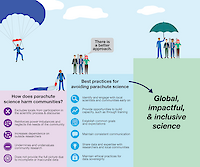
New paper alert! "Closing the parachute and opening the umbrella: Strategies for inclusivity and representation in producing impactful coastal ecosystem research." This paper was written in collaboration with several international friends and colleagues. Thanks for all your hard work!
Parachute science is the problematic and extractive practice of non-local researchers taking data, knowledge and information from communities of which they are not members. This practice fails to engage the local community and local scientists, marginalizing them in most aspects of the research to the benefit of the non-local researchers. Parachute science is perpetuated by colonialism and unequal access to resources like funding, education and data. It is harmful to local scientists and undervalues the contributions of the community as a whole.
Here, we offer our perspectives on parachute science and suggestions on how to avoid it, based on our collective experiences conducting research internationally with diverse scientists and communities. Instead of a parachute, we suggest opening the scientific "umbrella" to incorporate diverse perspectives and local contributions to generate relevant and impactful science.
Exploring Jug Bay
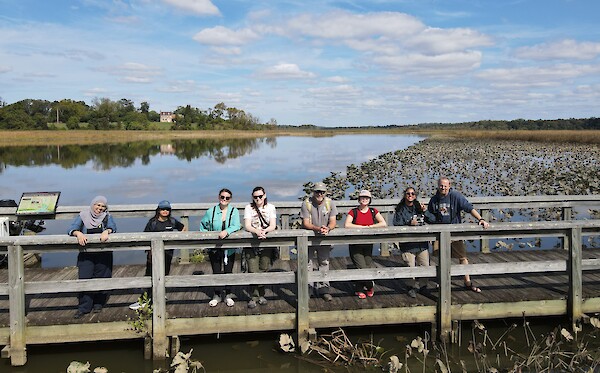
At the beginning of October, IAN staff took a field trip to Jug Bay Wetlands Sanctuary. This remarkable place protects 1,700 areas of tidal freshwater marshes, forested wetlands, upland and riparian forest, creeks, meadows, pine and sand barrens, and fields along the Patuxent River. The Patuxent is one of the Chesapeake Bay's smaller tributaries. Jug Bay is one of three components of the Chesapeake Bay National Estuarine Research Reserve. Jug Bay is also the site of Native American settlements stretching back at least 10,000 years. Our nature-loving staff was excited just to be outside on a beautiful early-autumn day!
Enhancing scientific storytelling at the Chesapeake Watershed Forum
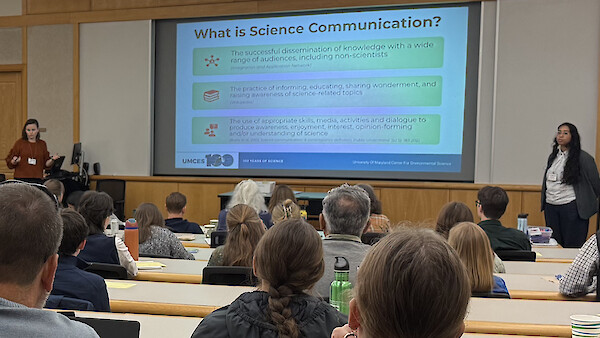
The weekend of November 7th was the 20th annual Chesapeake Watershed Forum in Shepherdstown, West Virginia. The theme of this landmark Forum was “Shaping the Future of Conservation with Human-Centered Approaches." IAN staff Alexandra Fries, Conor Keitzer, Annie Carew, and Roshni Nair-Gonzalez attended the Forum. Annie and Rosh presented IAN's popular workshop "Storytelling for Science Communication" to over 60 practitioners from across the Chesapeake Bay Watershed. Forum attendees include researchers like us, natural resource managers, community advocates, and educators. We caught up with our partners and collaborators from the Chesapeake Monitoring Cooperative, which is celebrating its 10th anniversary this year. The Forum is always a lot of fun, and we're already looking forward to next year's!
2024 Maryland Coastal Bays Report Card Release Event
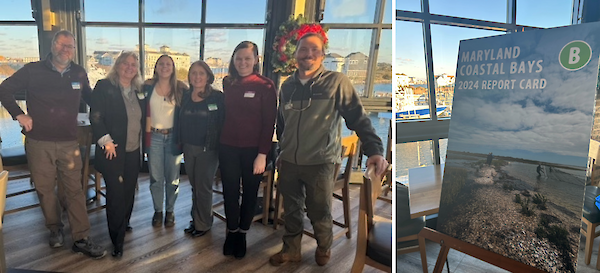
The 2024 Maryland Coastal Bays Report Card was released on December 11, 2025 in Ocean City, Maryland. The Coastal Bays received their highest-ever grade this year, a B! There were large increases in seagrass coverage in Newport Bay and Sinepuxent Bay, which is exciting news. The event was well-attended by Maryland Coastal Bays Program volunteers, staff scientists, and collaborators. Heath Kelsey and Annie Carew represented IAN and celebrated with our partners at the Maryland Coastal Bays Program and Department of Natural Resources.
CMC Fact Sheets Now Available in Spanish
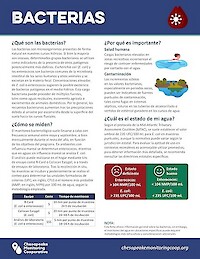
Last year, the Chesapeake Monitoring Cooperative (CMC), a multi-state effort to standardize water quality monitoring throughout the watershed, redesigned indicator fact sheets. These fact sheets give an overview of each water quality indicator, why it is important to the ecosystem, the tools used to measure the indicator, and what certain types of measurements and scores mean for water health. Now, the fact sheets have been translated into Spanish! The new documents can be found on the IAN website.
3rd Annual Scientists Serving Communities Workshop
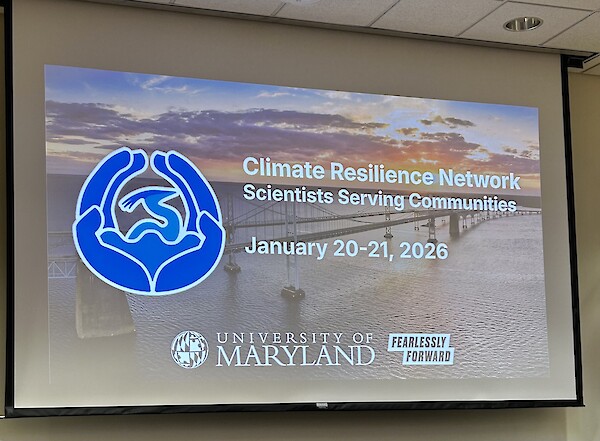
The 2026 Scientists Serving Communities workshop was held in College Park on January 20 and 21. This workshop brings together Maryland researchers, community leaders, decision-makers, and stakeholders who are instrumental in Maryland's climate resilience efforts. Partners in UMD's Climate Resilience Network include the Charles County Resilience Authority and the Integration and Application Network. Annie Carew attended on behalf of IAN. The workshop is dialogue-based, and all workshop sessions are panel discussions of climate resilience issues.